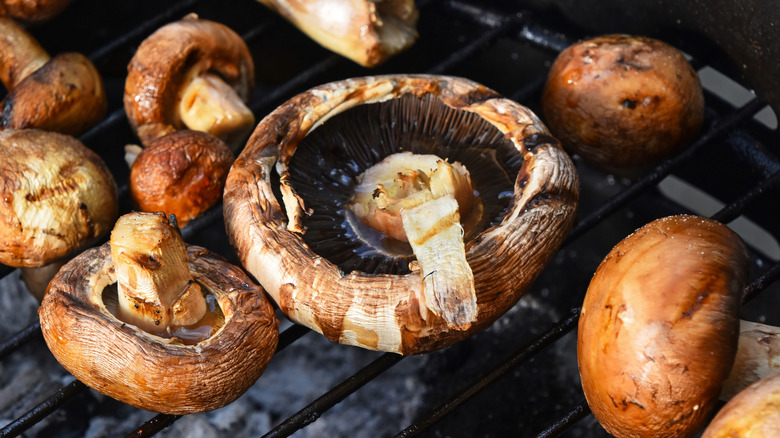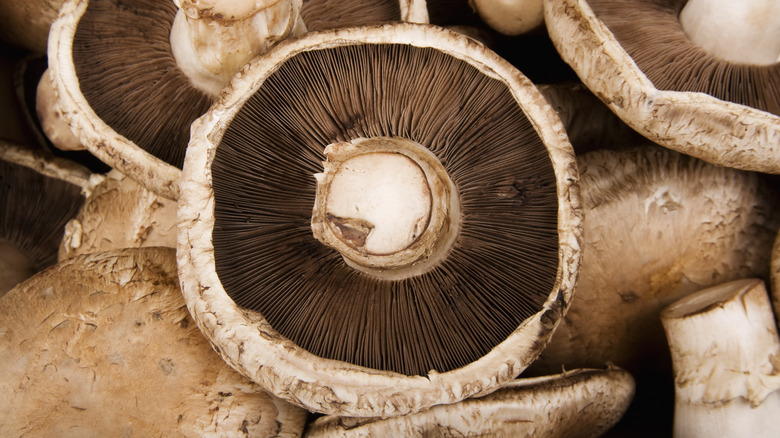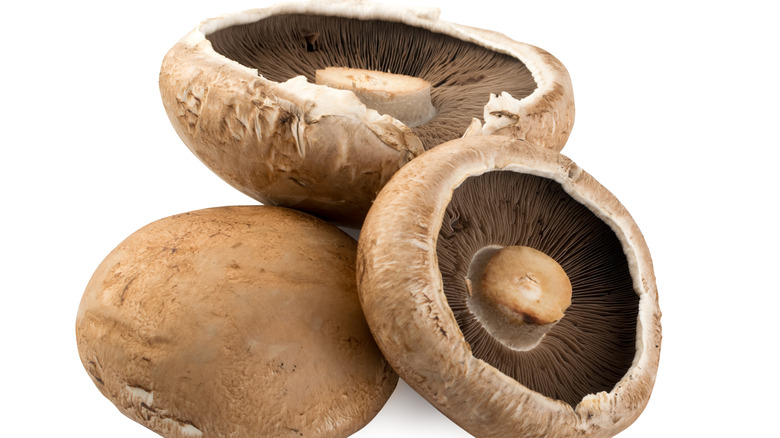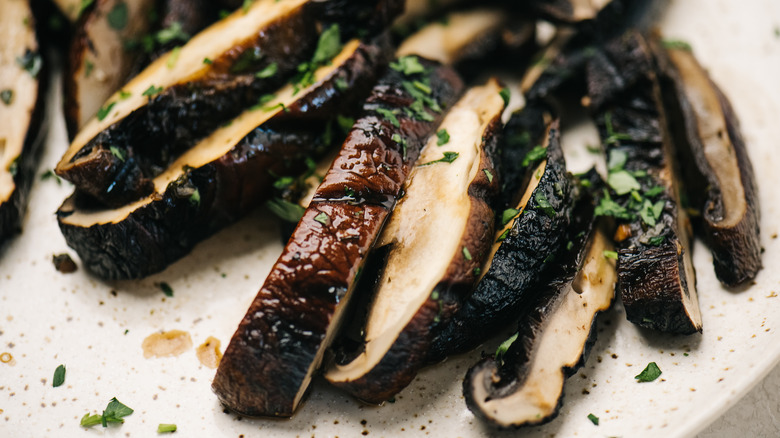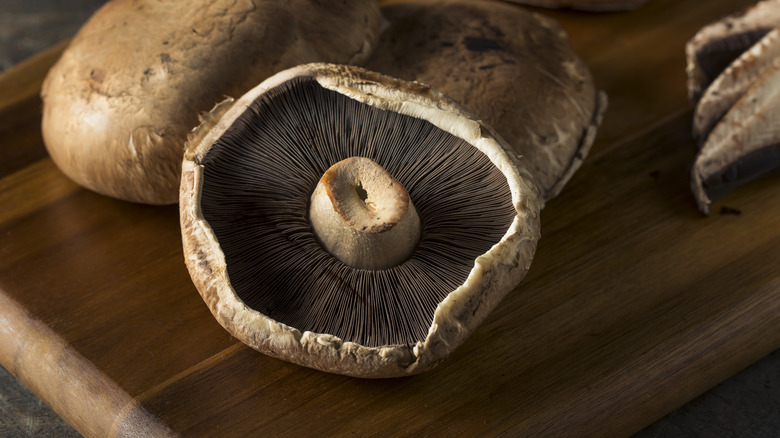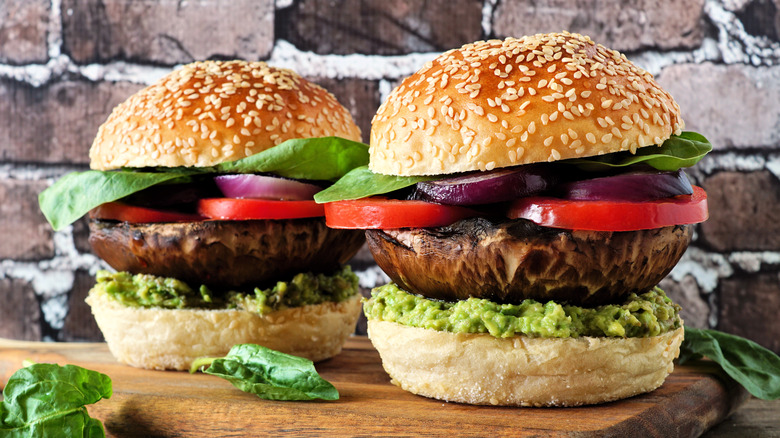Unexpected Benefits Of Portobello Mushrooms
Mushrooms have a long history among ancient cultures. According to a 2017 article in the Journal of Microbiology, Biotechnology and Food Sciences, the ancient Greeks believed mushrooms could give warriors strength in battle. Mushrooms were believed to be the secret to preserving youth in ancient China. The Egyptians believed Osiris gave them the gift of mushrooms, and the Romans believed mushrooms were the Food of the Gods and reserved them for special occasions.
The portobello mushroom we've come to love now didn't occur naturally. They were artificially cultivated in the 1600s. According to the University of Wisconsin-La Crosse, the portobello mushroom is the mature, brown strain of the Agaricus bisporus. They can be recognized by their large size and exposed, developed gills underneath before they're harvested. Other strains (and younger strains) of this mushroom are also called white button, crimini, or pizza mushrooms. Yep, they're all the same species of mushrooms. Whatever strain or maturity of the Agaricus bisporus you enjoy, they have some great health benefits.
They're a good source of protein and amino acids
A cup of mushrooms has 21 calories and about 3 grams of protein, so you might not turn to portobello mushrooms as a chief source of protein, but the amount of protein isn't what gives portobello mushrooms their power. Mushrooms might be second to animal products in terms of crude protein, but they're closely comparable in amino acids. The nine essential amino acids in mushrooms make them a good source of plant-based protein for vegans and vegetarians. Mushrooms also have other amino acids such as alanine, arginine, and tyrosine.
According to Cleveland Clinic, amino acids combine to make different proteins in your body. Amino acids help your body break down food, repair tissues, build muscle, and boost immunity. They also keep your skin healthy and make neurotransmitters for your brain. Although your body needs 20 amino acids, it can't make nine of them, so you have to get them from your diet.
They have anti-cancer and pro-immunity polysaccharides
A one-cup serving of mushrooms has less than 3 grams of carbohydrates, but oligosaccharides and non-starch polysaccharides make up most of the carbohydrates in mushrooms. Oligosaccharides work as a prebiotic to feed the good bacteria in your gut and improve your immunity. Typically, they're only found in plant foods.
The polysaccharides in mushrooms have anti-cancer benefits. A 2014 study in the Journal of Food and Nutrition Research extracted the polysaccharides in portobello mushrooms to test their effect on cervical cancer cells in mice. The polysaccharide limited the growth of these cells, but it also stimulated immunity for the spleen and thymus.
The portobello mushroom is higher in chitin than other mushrooms. According to Exo Protein, chitin is a type of fiber that acts like a prebiotic in the gut. A 2018 study in Clinical Reviews in Allergy & Immunology says that chitin is a polysaccharide that activates our adaptive immune cells and promotes the production of cytokines, which control inflammation in our bodies.
They're rich in vitamins and minerals
Portobello mushrooms are rich in many minerals, such as potassium, phosphorus, calcium, magnesium, iron, and zinc. They're also rich in B vitamins such as folic acid, riboflavin, niacin, and thiamin. B vitamins help process energy from the food you eat. Mushrooms also have ergosterol, which can be converted to vitamin D2 when it's exposed to UV light, according to a 2013 study in PLOS One.
The study recognized the importance of vitamin D in the diet to support our central nervous system. Neurological and psychological disorders are often linked with low levels of vitamin D. Because mushrooms are a good source of ergosterol, this study treated mushrooms with UV light to convert the ergosterol to vitamin D2 and then freeze-dried them. The researchers then fed the mushrooms to mice for seven months while others were fed a diet low in vitamin D2. The mushroom-fed mice showed improved learning and memory and reduced abnormalities related to dementia.
They're also full of protective antioxidants
Antioxidants help protect the body against the damage of free radicals, which are waste products cells release into the body. Our bodies suffer from oxidative stress if they can't remove these free radicals efficiently. Oxidative stress is often linked to many chronic diseases.
Mushrooms are naturally rich in the antioxidant ergothioneine, which can help people with type 2 diabetes. A 2016 study in Plant Foods for Human Nutrition studied 37 people who ate 100 grams (a little more than a cup) of mushrooms every day for 16 weeks. Mushrooms helped reduce oxidative stress and increase the anti-inflammatory hormone adiponectin, which also helps with insulin sensitivity.
According to a 2017 study in Food Chemistry, mushrooms are also rich in glutathione. Glutathione reduces oxidative stress from poor nutrition, stress, and toxins from our environment. According to Healthline, glutathione can help with insulin resistance, Parkinson's disease, autoimmune disease, and fatty liver disease.
How you can add portobello mushrooms to your diet
Fresh mushrooms should be eaten within a few days because they can spoil quickly after you bring them home. It's best to keep them in their original package in the refrigerator until you're ready to cook them. Just before cooking your portobello mushrooms, give them a good wash using plain water. Make sure you wash your hands after handling them.
Portobello mushrooms are large, so if you slice them into thick pieces, you can grill them just like a burger. You can also stuff portobello mushrooms and bake them, or marinate them in olive oil, vinegar, and your favorite spices.
Remember that portobello mushrooms are the brown, mature versions of the Agaricus bisporus, so you can add the white button versions to your favorite stir-fry or omelet. Mushrooms also made a great topping to a salad, or you can make a great lentil and mushroom soup.

